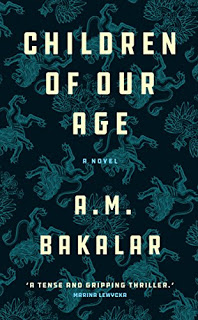(Children of Our Age by A.M. Bakalar, Jantar:2018)

A while ago I wrote about three novels that I called “the most truthful, most political novels I’ve read” for some time: “Preparation for the Next Life by Atticus Lish, The Sarah Book by Scott McLachlan, and Blood of the Dawn by Claudia Salazar Jiménez.
To that list of highly recommended reads I’d like to add Children of Our Age by A.M. Bakalar. What a book. Where Lish in Preparation for the Next Life wrote about the way undocumented workers are ruthlessly exploited by others, Bakalar’s focus is on those who would exploit them. Her characters are Polish immigrants to London who have just barely managed to scrabble up to a precarious but undeniably middle-class way of life. Their success has many times come at the cost of their humanity: those who have learned to traffic humans, and to treat human beings with the same level of detachment as they would livestock, are the ones who, at least at the beginning of this harrowing novel, are most likely to succeed.
What makes this novel great is the way Bakalar manages to create empathy for all of her characters, even the most ruthless and damaged of them. For example Bakalar writes a scene in which a thuggish violent man stalks, rapes, and strangles a sixteen year old girl. It’s a scene every bit as harrowing as Joyce Carol Oates at her disturbing best, but then, in a surprising coda, Bakalar lifted me out of a knee-jerk repulsion for this character, and left me instead with a feeling of empathy and sadness for what this man had endured in life. Time after time I was plunged into a sense of compassionate understanding for characters that behave in selfish and disturbing ways. It’s quite a ride. The novel offers no easy answers. A lot of bad things happen. And yet somehow I finished feeling compassionate and hopeful.
Some novels perform the important work of shedding light on the ways economic inequality corrodes human endeavor, even in relatively well-off societies. Politically-oriented social realism, with a focus on the working poor, has not been a wildly trendy type of novel for some time, and that’s too bad, because this kind of fiction provides a way into the lives of others, and it’s the kind of understanding we can use more of just now.
– Lark Benobi
(buy The Book of Dog by Lark Benobi)